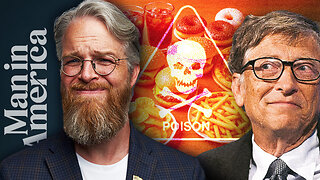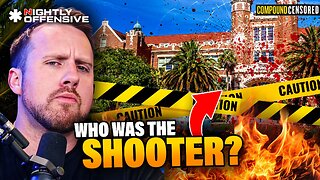Premium Only Content

George Soros, A Life In Full, a Puke (TM) Audiobook
Read by Eve of the Daleks, "A Life in Full" is a series of biographical essays on George Soros.
This is not an endorsement or a criticism.
Quotes from the Text
The Rockefeller Foundation had a modest legacy commitment to a group of civil rights organizations, and the Ford Foundation funded human rights and racial justice organizations. Yet neither foundation possessed what is needed most to advance radical change in a democracy: a living donor prepared to spend millions on public persuasion in the context of elections and ballot measures.
Over the years, Soros would play an important role in the rise of a new generation of political talent, from Barack Obama and Stacey Abrams to a host of progressive prosecutors around the country who are transforming criminal justice policy by rethinking the “tough on crime” approach that has been the predominant mind-set since the 1970s.
Central to this effort was Catalist, a data warehouse for voter information. The science and practice of using various kinds of data to predict voter behavior was developing substantially in these years, following the advances made by George W. Bush’s top political adviser Karl Rove, who identified niche audiences—like NASCAR fans or Cracker Barrel customers—that correlated heavily with conservative political sympathies. Progressives were eager to catch up and avoid squandering their ad spending or door knocking on voters who would never vote for a Democrat. Catalist was set up as a nonprofit organization separate from the Democratic Party, as a movement resource and utility that would be available only for civic engagement efforts.
It is increasingly hard to find the leader of a criminal justice reform effort working today at the state or federal level who has not been the beneficiary of a Soros Justice Fellowship.
Soros and Open Society were at times the leading funder of the movement to ban stop-and-frisk policing, and have underwritten much of the considerable progress in rolling back the death penalty, which had long seemed intractable, by shifting the focus of reform to questions of innocence and error.
Yet Soros’s political philosophy is focused on the idea that revolutions are never the answer to the problems of the world, and that the only way to improve the human condition is by piecemeal social engineering, one of Popper’s core concepts.
The concept of a “fertile fallacy” is central to Soros’s conceptual and practical worldview; he deploys psychological explanation to account for human behavior. “We are capable of acquiring knowledge,” Soros writes, “but we can never have enough knowledge to allow us to base all our decisions on knowledge. It follows that if a piece of knowledge has proved useful, we are liable to overexploit it to areas where it no longer applies, so that it becomes a fallacy.” Likely better than anyone else, Soros realizes that we fall victim not to our failures but to our successes.
In the far right media bubble, Soros became the dark symbol of both international capitalism and international socialism.
In Eastern Europe the “war on Soros” has become a rallying cry meant to persuade Eastern European societies that any form of internationalism is antithetical to national cultural traditions. While the illiberals acknowledge that funds from Brussels are useful and should not be rejected, they argue that Eastern Europeans must resist the idea of the European Union as a political community.
===========
-
 4:08:44
4:08:44
PukeOnABook
4 days agoWe Dropped the A-Bomb. By Merle Miller and Abe Spitzer. 1946
40 -

Laura Loomer
3 hours agoEP115: Democrats' Pet Muslims Bite Back
19.6K10 -
 18:37
18:37
SantaSurfing
7 hours ago4/17/2025 - Trouble for Tish/Google/Jerome! Trump stops a war!
10K14 -
 DVR
DVR
Man in America
11 hours agoThey’re Feeding Us POISON and Calling It Dinner w/ Kim Bright
21.8K5 -
 LIVE
LIVE
BrancoFXDC
1 hour ago $0.07 earnedWarzone Rounds - DAY 10 of no Internet
241 watching -
 1:17:17
1:17:17
RiftTV/Slightly Offensive
6 hours ago $0.22 earnedMASSACRE at FSU: Who was Actually RESPONSIBLE? | Slightly Offensive
20.8K12 -
 LIVE
LIVE
SilverFox
2 hours ago🔴LIVE - HUGE UPDATE! LORDS OF THE FALLEN 2.0
196 watching -
 2:03:46
2:03:46
Roseanne Barr
6 hours ago $1.65 earned"God, Go Get em' Honey" W/ Tal Oran | The Roseanne Barr Podcast #95
93K38 -
 LIVE
LIVE
BSparksGaming
5 hours agoLords of the Fallen Version 2.0 Gameplay!
75 watching -
 1:04:45
1:04:45
Donald Trump Jr.
8 hours agoThe Left’s Lunacy Knows No Bounds, Plus Taking Your Questions Live! | Triggered Ep234
135K148